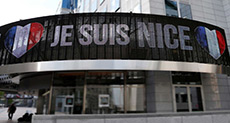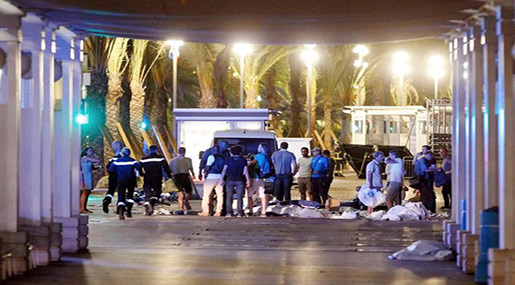
Terrorism: Punishment for Attempted Reconciliation

Darko Lazar
It's Groundhog Day... in France. Once again, a shadow has been cast over yet another French city in as many months.

This time, the target was France's Cote d'Azur. At least 84 people have been killed and 100 are injured. The weapon of choice was a lorry truck, which plowed directly through a crowd celebrating Bastille Day in Nice.
The attacker, identified by police as a 31-year old, Tunisian-born Frenchman, drove at high speed along the famed Promenade des Anglais seafront, before shooting at spectators who were watching the fireworks display.
In the aftermath of the horrific attack, it was certainly a case of déjà-vu.
Resembling a flashback to the Paris attacks claimed by the Daesh [Arabic acronym for "ISIS" / "ISIL"] terror group in November and January of last year, the Nice carnage received worldwide condemnation, catchy phrases on social media and more pledges from French officials not to "yield" in their will to confront terrorism.
But it was France's Prime Minister Manuel Valls who helped put things into perspective.
The neoconservative French politician and prominent western advocate of Zionism used "Israel" as a model when explaining that the state of emergency in France would be permanent.
"France has to learn to live with terrorism," Valls said.
Indeed, the French should strap in for "six more weeks of winter".
From the recent, well-organized operations carried out by terrorists in Paris to lone-wolf attacks (almost impossible to prevent from an intelligence and security standpoint), the state is manipulating the fearful public into accepting a permanent police state, which has nothing to do with actual security.
"Only the willfully ignorant could possibly believe that Daesh is an enemy of France when the French have never had better relations with the country which openly backs them - Saudi Arabia. The intelligence reports, declassified documents and admissions of the highest officials of the French and American governments all confirm that Daesh is ‘Israel's' Arab legion," opines Paris-based political author Gearóid Ó Colmáin.
The recent bloodbath, stretching from Nice to the Bangladeshi capital of Dhaka, mirrors previously well-established models adopted by top-secret organizations. Characterized as a 'strategy of tension', Gladio-styled attacks during the Cold War 1.0 were historically planned and executed by assets of US-NATO military intelligence agencies in the hope of preventing Europe's ‘slide to the left'.
History teaches us that in politics and global terrorism nothing is random, while brutal acts of terror often coincide with those moments when a not-so-subtle message needs to be sent to a particular state or government, especially when it comes to its attitude towards Russia, Iran and Syria.
This phenomenon is becoming increasingly evident in Paris, where President François Hollande and his cabinet are coming under increasing pressure from both the public and the country's lawmakers to change course in the Middle East and reconcile with the Kremlin.
And less than a week before the Nice attack, Hollande caved indeed.
During the NATO summit in Warsaw, described as being of paramount importance to the western military alliance reeling from the Brexit vote and facing a ‘resurgent' Russia, Hollande called Moscow a partner, rather than a threat.
"NATO has no role at all to be saying what Europe's relations with Russia should be. For France, Russia is not an adversary, not a threat; Russia is a partner," Hollande said.
The statement, which highlighted discord inside NATO, came on the heels of a vote by France's lower house of parliament in late April. French deputies voted in favor of a non-binding resolution to lift European Union sanctions against Russia, imposed over Moscow's annexation of Crimea and the conflict in Ukraine.
Similarly, in the lead up to the Charlie Hebdo attack in January of last year, France found itself in a dilemma over whether to deliver the Mistral-class amphibious assault ships to a Russia under sanctions, against the wishes of Washington and NATO.
Following a very public display of brutality, with masked gunmen carrying automatic rifles and roaming downtown Paris, the ships were sold to Egypt.
Fingerprints belonging to the US Central Intelligence Agency were also found on at least one of the weapons used in the November 13 terror attacks in Paris. The M92 semiautomatic pistol was purchased by Century International Arms and then re-exported to Europe. Century Arms, based in Delray Beach, Florida, is one of the largest arms dealers in the United States, with close ties to the CIA.
Much like his French counterpart, Turkey's President Recep Tayyip Erdogan, who played his part in the rise of Daesh, received similar, unambiguous messages when he decided to normalize relations with the Kremlin earlier this summer.
Less than 24 hours after Erdogan apologized to Moscow for downing a Russian jet in November of last year 40 people were killed in suicide attacks at Istanbul's international airport.
Apparently, Erdogan did not get the message. And so Turkey's strongman, seemingly untouchable, finds himself at the center of an attempted military coup.
In a recent interview with Australia's SBS News, Syria's President Bashar al-Assad explained that the vast majority of western governments attack Damascus "politically and then they send officials to deal with us under the table, especially in security."
They don't want to upset the United States," the Syrian leader said. "Actually most of the Western officials only repeat what the United States want them to say. This is the reality."
In that reality, Mr. Valls is right on the money. France should get used to terrorism.
As a matter of fact, any country that ‘upsets' the US and refuses to deploy recourses to the Middle East or contribute to NATO's expansion towards Russia, might find itself at the receiving end of a pointlessly bloody terrorist attack designed to impart shock and awe. That includes Pakistan and Bangladesh for hammering out deals to purchase Russian and Chinese-made weapons; France, Germany and Italy for openly criticizing the sanctions regime against Russia; the United Kingdom for tearing up the book on a universal system of governance; and of course, just about every country across the Middle East for simply being in the way.
Source: al-Ahed News



